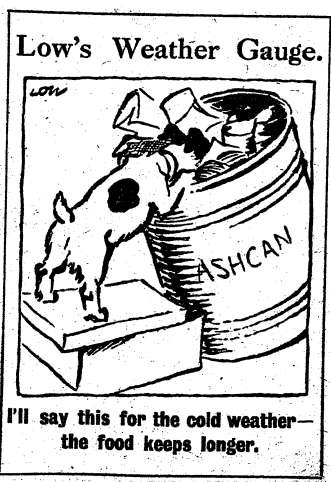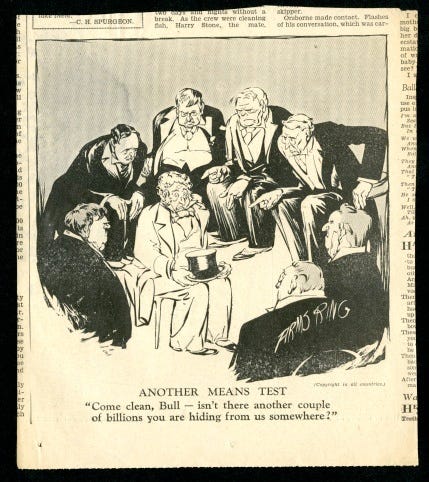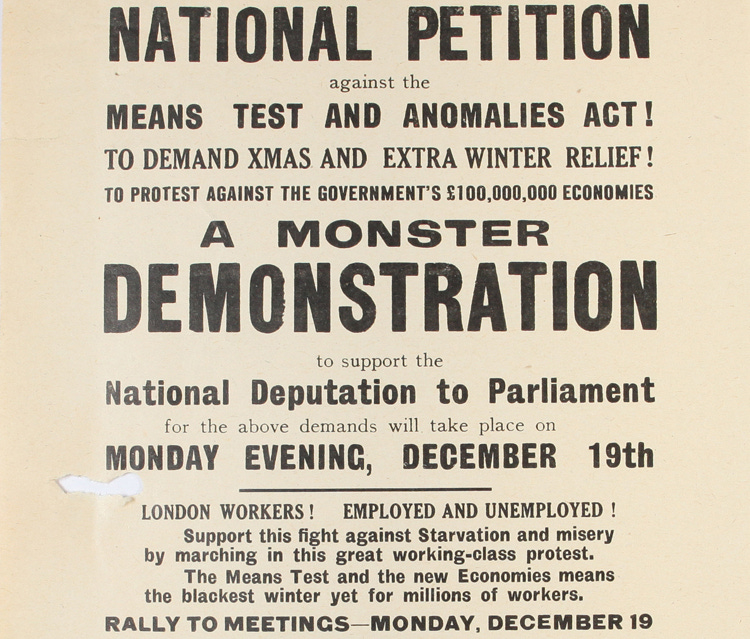“It’s 10 to eight; time now for Thought for the Day…”
ALEXA! OFF!
I detest the patronising, often glutinous, stale religious croissant that is Thought for the Day on BBC Radio Four’s otherwise unmissable Today Programme. As smartspeakers proliferate, there will eventually come a time when, at 7.50am, the great collective British shout of ALEXA! OFF (or Google, or Big Facebook Ellon Musk Brother) will cause a minor earthquake, even in Langham Place, London.
Anyway, you don’t have to listen to the following homily. Or read it. But it does contain a bit of the 1611 Bible. You have been warned.
Ah'm no the factor nor the gasman
Napoleon nor Ronald Coleman
When ye hear me rat-tat-tat upon the door
"Have you money in the bank or money in the store?"
Ye'd better look oot or else ah'll get ye
Try and dodge me if ye can,
For ah'm neither Santa Claus nor Douglas Fairbanks
I am the Means Test man…
Money. Money in the bank, money in the pocket. Money that comes in monthly and goes out daily. Money for food, heat, lighting, cooking. Money for internet, TV, buses, cars, clothes. Money in the hand. How much do you have? Not enough to keep warm or feed the kids or yourself?
There is help available, but you have to ask for it. You have to identify yourself as in need. And then people come and check that you really need it. Or really, really need it. They test your means.
Could there be anything more humiliating? Maybe queuing in front of your neighbours for a foodbank. Or I heard about a well-meaning Edinburgh lady who was in the habit of buying bags of groceries for neighbours she thought deserved help and hanging them from their front door handles. Prominently.
Means testing has been a feature of social benefits since they were introduced, and sometimes it was administered with grim, exhibitionist brutality. Humiliation was the price you paid. Of course, it’s understandable that only those who need help should get it, and there were - and are - inevitably those who seek to exploit the system for their own benefit when they don’t deserve it.
Nowadays it may be done with relative discretion but everything from Universal Credit to care home eligibility before death is means-tested, often by the provision of proof that you’re in receipt of some other aid, but sometimes by more intrusive methods. The state pension is not, just as long as you’ve paid your national insurance for long enough. As I have discovered, now being over 66 and in receipt of my monthly £817.44. And very welcome, after a lifetime of freelance scrabbling, it is too.
Now we are facing a cost of living crisis, fuelled by huge rises in energy prices, Brexit, food cost inflation, COVID-19, and worse to come.
The island community I live in has for decades been extremely wealthy, with almost full employment and an oil-rich Council, with its affiliated trusts, providing services and infrastructure second to none in Scotland.
Now, however, in these troubled times, some residents are facing hunger, cold, the inability to feed family members or afford transport to and from work or shopping. And this is a proud community where admitting vulnerability or poverty is difficult. It is also a caring community where people tend to look out for one another. But there is, and will be for some time to come, a need for public bodies to help those, often those in work, with the provision of food, energy, and services they find themselves unable to afford.
Charitable organisations are already delivering this kind of help, and they do it in ways that endeavour to be accessible, open and stigma-free. Lunch clubs, free transport and the like are readily valuable. And there is more charities and other organisations could do. Could the Shetland Charitable Trust, which administers the isle’s oil compensation funds, reinstate the annual pensioners’ Christmas bonus, which was once paid automatically to all residents over pensionable age? Should the Shetland Community Benefit Fund, which administers compensation from the isles’ industrial windfarms, change its position on paying out only to organisations and find a way of supporting individual and families in need? Our local community development group, NCDC, spent some of the profits it gains from the hugely successful Polycrub on a ‘bonus’ last year for all Northmavine residents as a post-lockdown measure.
What about the practicalities? Because although this is a caring and close society, that brings problems with confidentiality. Are there essentially invisible ways for public bodies to help, without the risk of stigma, blame, gossip and bullying, particularly of children?
Pre-pay electricity cards can already be subsidised using fuel vouchers. Could account cards for local shops be issued to all local residents, with those in particular need able to access additional discounts? Or maybe there should simply be temporary grants or discounts for all pensioners and all families with children under, 16? Child benefit obviously continues to exist, with clawback in tax from those with higher incomes, but I’m talking about extra measures to deal with the crisis we’re facing now.
I heard of a church in Edinburgh that simply put out baskets of food and essential goods along its wall every morning, for anyone to help themselves to. Sure, some abused the system. But not many. Maybe we have to be indiscriminate in our generosity.
I’m not in the habit these days of quoting the Bible, but I’ve always liked some of Jesus’ visual jokes. And you can imagine the Lee-Evans-like physical contortions that accompanied this vignette from the Sermon on the Mount (Matthew chapter six; this is in the King James Version, the only translation worth memorising):
Therefore when thou doest thine alms, do not sound a trumpet before thee, as the hypocrites do in the synagogues and in the streets, that they may have glory of men. Verily I say unto you, They have their reward. But when thou doest alms, let not thy left hand know what thy right hand doeth. That thine alms may be in secret…
ALEXA!
It was 90 years ago…protests against the Means Test Act in 1932. the other cartoons are from the 1930s, courtesy of the University of Kent’s British Cartoon Archive.


